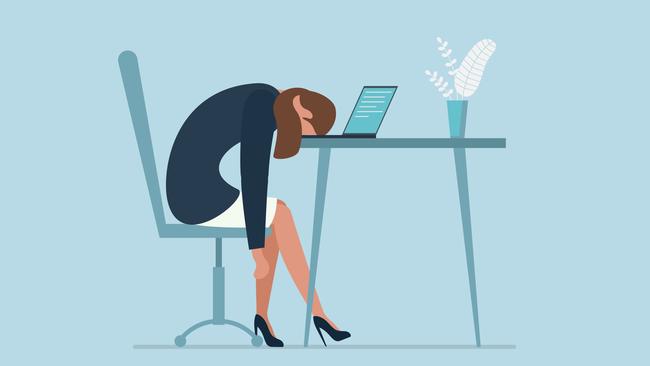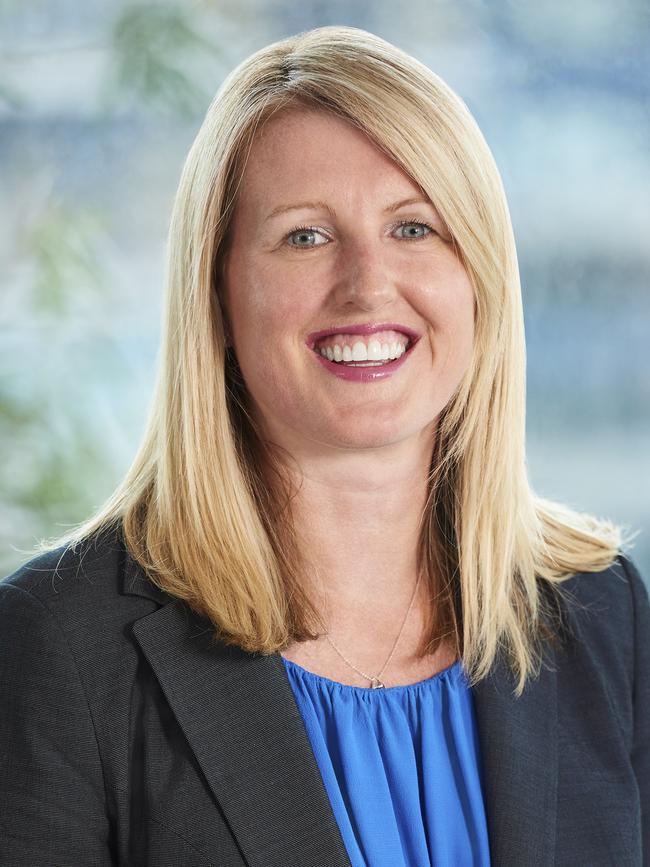Has the Covid-19 pandemic killed the office sick day?
Some Australian employees have become victims of their own success in working from home.

As the Covid-19 pandemic enters halfway through its third year, bosses of Australia’s biggest companies are urging their staff to stay away from work at the slightest hint of sickness, even if they have the previously innocuous common cold.
Gone are the days of when Aussies would “soldier on” — like in the old Codral advertisements — pop a cold and flu pill, stuff a hanky up their sleeve and hop on a packed train to their high-rise CBD office.
But they aren’t hiding under the doona either. I interviewed Medibank group executive people and culture, Kylie Bishop, for this story while she was isolating at home with Covid-19.
The pandemic has sparked a shift to remote or hybrid working, where being at the office full-time from 9am to 5pm is no longer necessary and neither is taking the humble “sickie” — even if you are unwell. Employees have managed to structure their work days around home life, rather than the other way around, erasing the need for “unplanned absences”.
Remote working has become the biggest office trend since hot-desking a decade ago — with thousands of Australian employees encouraged to again work from home during the latest wave of Covid-19 infections.
NIB even pays its staff $1200 a year each in recognition of “renting space in people’s homes”, the government’s peak science agency, CSIRO, arranges for the home delivery of ergonomic office equipment for its employees, while Australia’s biggest health insurer Medibank has become workplace agnostic.
Unions have also weighed in, stepping up demands on employers to better protect workers by ensuring all employees who can work from home do so, going further than advice released by the country’s leading doctors.
But could this new flexibility be making Australian employees sicker?
Katherine Paroz, a former human resources executive at Telstra who now heads CSIRO’s HR division, believes there could be longer-term pain — and a greater cost to staff and their bosses.
“Doctor’s appointments, picking up kids, looking after parents, sick kids or your friend who broke up with their boyfriend, meeting the bank/accountant, going to the dentist, running errands …. all stuff that was hard to do on the weekend could require a sickie,” Paroz says.
“This is before we even mention hangovers, late nights or ‘doona’ mental health days. All real needs in their own way but not covered by legitimate employer leave categories and ending up as ‘unplanned absences’ with HR codes like SLNMC (sick leave no medical certificate).
“(But) are we in fact replacing the unplanned sickie — which as employers we endlessly complained about the cost of — with the risk of long-term impacts on the wellbeing of our people due to long hours of work, less than ideal ergonomics, social isolation, poorer relationships and connection to work communities, less than ideal training and development arrangements and conditions where we begin to believe meeting people on video calls is actually a substitute for real human interaction?”
And here is how Australian workers became victims of their own success during the pandemic.
Paroz says employees adjusted quickly when they were initially ordered to work from home when Covid-19 hit in early 2020, up-ending previous “suspicions” about the practice.
“Amazingly most things kept happening and productivity was okay. Most people actually
began working harder and lines blurred further between work and life.
“In fact now, even if people are sick it is more likely they keep working …. get out of bed, down a few codral, head to the laptop, camera off, and keep going. Save all of the sick leave for when you really hurt yourself or get really sick at some point in the future. Manage all your other life stuff in a long weekday, blending work with life from as early as 6am often until late in the evening.
“And therein lies our next challenge.”
When I speak to Medibank’s Kylie Bishop, she begins the interview with a disclaimer. “I will let you know, I’ve got Covid, just so it doesn’t sound awkward on the phone from time-to-time I might just mute myself so you don’t have me coughing in your ear”.

We press on. Bishop says that absenteeism levels at Medibank are beginning to return to pre-pandemic levels. Although Bishop made an exception for a media interview, the health insurer encourages people to take a sick day if they’re unwell.
“You can see that decline in the expectation that I still have to attend this meeting but I’m feeling a little bit not right and normally I would have taken a sick day,” Bishop says.
“It’s something that we have tried to keep a really live conversation in leadership teams. You’re in my meeting, I would say ‘Jared, I think you can just afford to be sick today, there’s no need for you to join this meeting’. It’s often the storytelling of that, that we try to be really strong on.”
It’s a message that extends beyond companies where the majority of staff are “knowledge workers”. Even businesses where workers must be on location to prevent mass disruption — just look what happened across the supermarkets earlier this year when pandemic isolation rules sparked grocery shortages — are encouraging their workers to stay at home if they’re unwell.
A spokesman for Australia’s biggest supermarket chain, Woolworths says the message is clear, and that if people are sick they should take sick leave and rest.
“Since the start of the pandemic and its various waves, we have consistently reinforced the need for team members to take care of themselves. This ranges from taking sick leave if they are unwell, so they can get rest and recover to also in support functions giving team members the flexibility to work from home,” he said.
“The recent rise in cases as well as the cold and flu season also reflects on the duty of care to our customers, team members and communities. We all have a role to play in staying COVIDSafe and maintaining our COVIDSafe measures, especially now as cases rise again.”
This can be easier said than done when casual workers face the risk of not being paid, as inflation returns, if they take sick leave. To this end, Anthony Albanese backflipped on maintaining the $750 emergency payment for workers without sick leave, following pressure by state leaders, unions and some even in his own party.
NIB group chief people officer Martin Adlington says the working from home experience “has been one of evolution”.
“We’ve all worked through the pandemic period where we have all had to get used to these work practices and for us we decided to implement that hybrid work in an ongoing way,” Adlington says.
“What we have seen though, is quite quickly we’ve fallen into good practices. What we’re always on the lookout for is we’re giving people the flexibility on the one hand but on the other hand, making sure they have the right to disconnect as well.”
ANZ Group Executive Talent & Culture Kathryn van der Merwe said while it was hoped “Covid-19 was behind us, globally we’ve come a long way in understanding the virus”.
“We now know there are a lot of really simple, but significant things we can each do personally, like wearing a mask and staying home when we’re not 100 per cent well,” she said.
“Like me, many have been enjoying being in the workplace and connecting face-to-face. Our major office buildings remain open for those who want or need to work from an ANZ location. However, if you would prefer to work from home and your job allows you to do so, you can for the time being. And if you’re considered a vulnerable person, we’re encouraging you to work from home in light of the current health advice.”




To join the conversation, please log in. Don't have an account? Register
Join the conversation, you are commenting as Logout